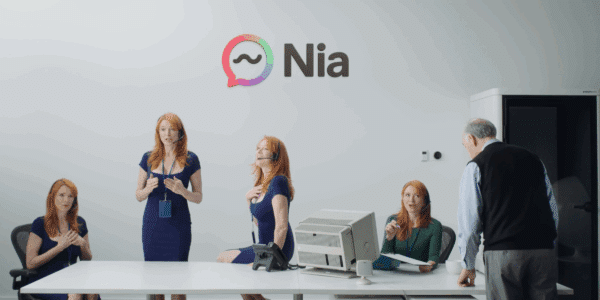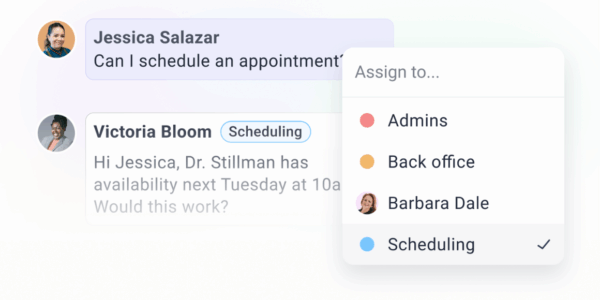Asynchronous messaging for mental health is becoming a must-have for clinics around the country. The United States is seeing more people seek out mental health care than ever before. As the stigma around seeking help when people need it most continues to fade, mental health clinics are finding new ways to provide the best possible care. For many, this includes supplementing asynchronous messaging like two-way SMS texting and live chat, real time options that allow counselors to provide help and guidance when it matters most.
OhMD CEO, Ethan Bechtel, recently sat down with KC Johnson, CEO of HealthSource Integrated Solutions, for “The Patient Conversation”. They address new ways to approach the crisis care continuum and mental health care more broadly through asynchronous messaging.
HealthSource Integrated Solutions is a multi-location 24/7 clinical call center offering crisis care and intervention, as well as managed IT services. They partner with mental health locations across Kansas to address crisis situations in real time and recommend solutions to better enable them to reach their patients with an immediate response. Recently, HealthSource and their partner Community Mental Health Centers implemented secure two-way texting as a new way for those in crisis to contact them.
KC Johnson has served every role from case management to operations for multiple crisis intervention centers. He shares his experience with two-way texting in the crisis care continuum and his vision for the application of asynchronous messaging in the future of mental health.
https://youtu.be/FyU4eicj2Lo
The role of asynchronous messaging for mental health in the crisis care continuum
Here is the challenge crisis call centers like HealthSource Integrated Solutions face on a daily basis:
“With our phones, if we have five crisis counselors on at any given time and you have five callers, then that means that sixth caller’s going to sit on hold because you can only have one phone call with one person [at a time]. That to me is a big challenge,” says KC Johnson. Because phone calling is a synchronous form of communication, crisis counselors’ capacity for intervention is limited by their numbers.
For callers who reach out in times of crisis, the window of opportunity to speak with them can be fleeting. “If there’s any kind of resistance or barrier to that person getting in touch with somebody to get the help they need, they might just hang up the phone.” Having to wait on hold presents a deterrent for vulnerable individuals seeking crisis care and is a dangerous flaw in the existing crisis intervention process.
Asynchronous messaging for mental health can help to solve for this capacity problem by giving crisis counselors the ability to help multiple people at a time. Instead of calling, people can text the clinic and communicate with a qualified mental health professionals. This maximizes crisis counselors’ time and gives people in crisis a faster way to reach help.
Two-way texting improves crisis care coordination
Not only do those in crisis contact HealthSource clinics via phone, but also law enforcement and medical professionals who must coordinate care for patients in distress. When the call center is busy, both police officers and nurses can be waiting on hold to reach the center and get a response. This slows down access to crisis intervention and takes up time that nurses and police offers could use to offer vital services elsewhere.
To solve for this downside with phone calling, HealthSource has expanded asynchronous messaging through secure two-way texting for use with these care coordinators. Synchronous messaging only allows for one chat per person at a time while asynchronous messaging allows for multiple conversations at a time. Now, coordinators can text or message HealthSource clinics directly to get in touch more quickly and streamline the crisis care continuum without having to wait on a message queue. Responding to those allies by text means counselors at HealthSource clinics can be helping people in crisis at the same time, instead of working through calls on a first-in basis.
Watch the full interview with KC Johnson of HealthSource Integrated Solutions on
The Patient Conversation!
https://youtu.be/sbjWnUiEn88



